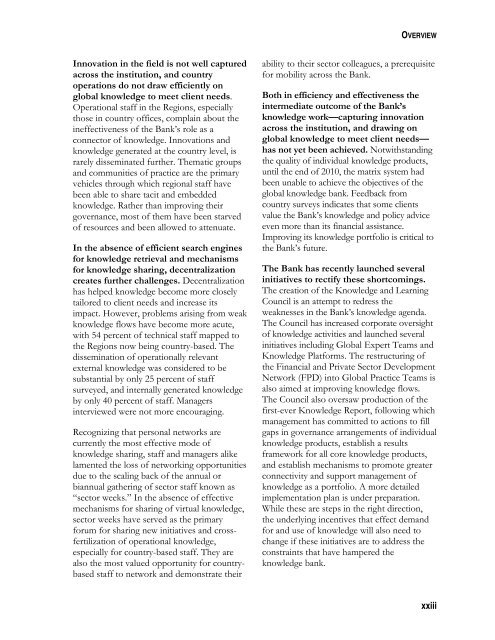The Matrix System at Work - Independent Evaluation Group - World ...
The Matrix System at Work - Independent Evaluation Group - World ...
The Matrix System at Work - Independent Evaluation Group - World ...
You also want an ePaper? Increase the reach of your titles
YUMPU automatically turns print PDFs into web optimized ePapers that Google loves.
OVERVIEW<br />
Innov<strong>at</strong>ion in the field is not well captured<br />
across the institution, and country<br />
oper<strong>at</strong>ions do not draw efficiently on<br />
global knowledge to meet client needs.<br />
Oper<strong>at</strong>ional staff in the Regions, especially<br />
those in country offices, complain about the<br />
ineffectiveness of the Bank’s role as a<br />
connector of knowledge. Innov<strong>at</strong>ions and<br />
knowledge gener<strong>at</strong>ed <strong>at</strong> the country level, is<br />
rarely dissemin<strong>at</strong>ed further. <strong>The</strong>m<strong>at</strong>ic groups<br />
and communities of practice are the primary<br />
vehicles through which regional staff have<br />
been able to share tacit and embedded<br />
knowledge. R<strong>at</strong>her than improving their<br />
governance, most of them have been starved<br />
of resources and been allowed to <strong>at</strong>tenu<strong>at</strong>e.<br />
In the absence of efficient search engines<br />
for knowledge retrieval and mechanisms<br />
for knowledge sharing, decentraliz<strong>at</strong>ion<br />
cre<strong>at</strong>es further challenges. Decentraliz<strong>at</strong>ion<br />
has helped knowledge become more closely<br />
tailored to client needs and increase its<br />
impact. However, problems arising from weak<br />
knowledge flows have become more acute,<br />
with 54 percent of technical staff mapped to<br />
the Regions now being country-based. <strong>The</strong><br />
dissemin<strong>at</strong>ion of oper<strong>at</strong>ionally relevant<br />
external knowledge was considered to be<br />
substantial by only 25 percent of staff<br />
surveyed, and internally gener<strong>at</strong>ed knowledge<br />
by only 40 percent of staff. Managers<br />
interviewed were not more encouraging.<br />
Recognizing th<strong>at</strong> personal networks are<br />
currently the most effective mode of<br />
knowledge sharing, staff and managers alike<br />
lamented the loss of networking opportunities<br />
due to the scaling back of the annual or<br />
biannual g<strong>at</strong>hering of sector staff known as<br />
“sector weeks.” In the absence of effective<br />
mechanisms for sharing of virtual knowledge,<br />
sector weeks have served as the primary<br />
forum for sharing new initi<strong>at</strong>ives and crossfertiliz<strong>at</strong>ion<br />
of oper<strong>at</strong>ional knowledge,<br />
especially for country-based staff. <strong>The</strong>y are<br />
also the most valued opportunity for countrybased<br />
staff to network and demonstr<strong>at</strong>e their<br />
ability to their sector colleagues, a prerequisite<br />
for mobility across the Bank.<br />
Both in efficiency and effectiveness the<br />
intermedi<strong>at</strong>e outcome of the Bank’s<br />
knowledge work—capturing innov<strong>at</strong>ion<br />
across the institution, and drawing on<br />
global knowledge to meet client needs—<br />
has not yet been achieved. Notwithstanding<br />
the quality of individual knowledge products,<br />
until the end of 2010, the m<strong>at</strong>rix system had<br />
been unable to achieve the objectives of the<br />
global knowledge bank. Feedback from<br />
country surveys indic<strong>at</strong>es th<strong>at</strong> some clients<br />
value the Bank’s knowledge and policy advice<br />
even more than its financial assistance.<br />
Improving its knowledge portfolio is critical to<br />
the Bank’s future.<br />
<strong>The</strong> Bank has recently launched several<br />
initi<strong>at</strong>ives to rectify these shortcomings.<br />
<strong>The</strong> cre<strong>at</strong>ion of the Knowledge and Learning<br />
Council is an <strong>at</strong>tempt to redress the<br />
weaknesses in the Bank’s knowledge agenda.<br />
<strong>The</strong> Council has increased corpor<strong>at</strong>e oversight<br />
of knowledge activities and launched several<br />
initi<strong>at</strong>ives including Global Expert Teams and<br />
Knowledge Pl<strong>at</strong>forms. <strong>The</strong> restructuring of<br />
the Financial and Priv<strong>at</strong>e Sector Development<br />
Network (FPD) into Global Practice Teams is<br />
also aimed <strong>at</strong> improving knowledge flows.<br />
<strong>The</strong> Council also oversaw production of the<br />
first-ever Knowledge Report, following which<br />
management has committed to actions to fill<br />
gaps in governance arrangements of individual<br />
knowledge products, establish a results<br />
framework for all core knowledge products,<br />
and establish mechanisms to promote gre<strong>at</strong>er<br />
connectivity and support management of<br />
knowledge as a portfolio. A more detailed<br />
implement<strong>at</strong>ion plan is under prepar<strong>at</strong>ion.<br />
While these are steps in the right direction,<br />
the underlying incentives th<strong>at</strong> effect demand<br />
for and use of knowledge will also need to<br />
change if these initi<strong>at</strong>ives are to address the<br />
constraints th<strong>at</strong> have hampered the<br />
knowledge bank.<br />
xxiii

















